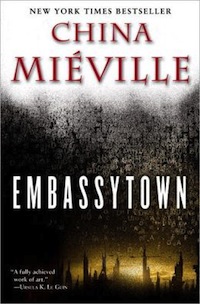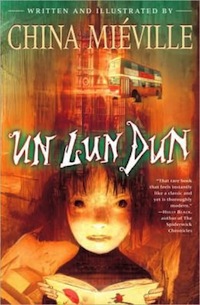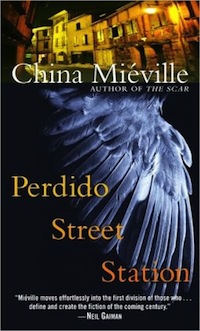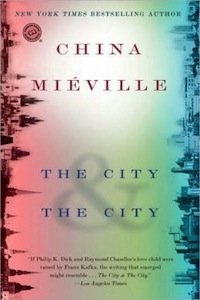China Miéville’s presence looms over genre fiction. Over the course of a dozen books, Miéville has ranged freely across categories and classifications—epic and urban fantasy, social and hard science fiction, crime, horror and more. And in each case, he addresses, dances with, pokes at and, ultimately, departs from, the traditions and expectations therein. Although many thousands of words have been written trying to put Miéville’s work into neat buckets (“New Weird!” “Fantastika!” “Literary Speculation!” “Hauntological Slipstream!” “Tentacular Metafusion!”), time has proven that a China Miéville book is ultimately, well—Miévillian. The man is a category unto himself.
And what is Miévillian? I’m tempted to use words like “tremendous,” “mind-blowing,” “amazeballs,” and “unmitigated brilliance,” but that doesn’t help especially. As each book is wildly different from its predecessor, the trick is to look at the qualities instead—a Miévillian book is packed with glorious entertainment, epic scale, powerful themes, intellectual depth, creativity of language, subversive approaches and, with a few rare exceptions, monsters.
He is also, and let’s just slap my bias on the table right now, easily my favourite author. If I were exiled to a desert island (possibly for overuse of hyperbole), I’d throw a really nasty fit until I got to take Perdido Street Station with me. And then I’d still sneak back for a copy of Un Lun Dun. And The Scar. And a few essential short stories. And… Let’s be honest, I’d be terrible at island life.
But, in this dark and uncertain world, I have to face the horrifying truth that not everyone has read Miéville. (Yet.) And with that weight of expectation (and the prodigious size of some of his novels), I can understand how one’s first foray can be a daunting task. Each and every one of his books is shellacked in critical acclaim and a-glow with reader adoration—so which makes the best place to start?
As with all reading decisions, this one is up to you. But here are a few recommended starting points:
The One at the Edge of the Everything
 Embassytown (2011) takes place in tremendously imaginative city—but in this case, the setting is solidly science fictional. Embassytown is the city at the edge of the known universe, a tiny outpost of humanity on the alien world of Arieka. The Ariekei are, um, sort of Bug Eyed Monsters, insectile aliens with two mouths and a deep, deep love of words (they call it ‘Language’). Because of the whole ‘two mouth’ thing, communicating with them is tricky, the humans have to chat through specialised Ambassadors—twins who have been genetically tweaked to speak in unison. The result is a chilly status quo. The Ariekei could reduce the human settlement to rubble, but don’t bother because they’re fairly polite (and a bit curious). The humans indulge the Ariekei with the Ambassadors, but mostly just milk the planet for exotic biotech. They’re visitors, not colonists.
Embassytown (2011) takes place in tremendously imaginative city—but in this case, the setting is solidly science fictional. Embassytown is the city at the edge of the known universe, a tiny outpost of humanity on the alien world of Arieka. The Ariekei are, um, sort of Bug Eyed Monsters, insectile aliens with two mouths and a deep, deep love of words (they call it ‘Language’). Because of the whole ‘two mouth’ thing, communicating with them is tricky, the humans have to chat through specialised Ambassadors—twins who have been genetically tweaked to speak in unison. The result is a chilly status quo. The Ariekei could reduce the human settlement to rubble, but don’t bother because they’re fairly polite (and a bit curious). The humans indulge the Ariekei with the Ambassadors, but mostly just milk the planet for exotic biotech. They’re visitors, not colonists.
Of course this tenuous state of affairs doesn’t last, and everything gets… involved. For a book takes place surrounded by (extremely alien) aliens, Embassytown is very much about what defines us as human, interrogating gender and sexuality, language and thought, complacency and agency. All, of course, with a properly space operatic background and—again—monsters (of the “gigantic multi-dimensional” variety).
The One with the Carnivorous Giraffes
 If that description makes Un Lun Dun (2007) seem silly… it is. Wonderfully so. Miéville’s first foray into young adult fiction is deliberately off-beat, and as such is both an exceptionally insightful subversion of the genre and a terrific story. When Zanna is revealed as the “Shwazzy”—the ‘chosen one’ of the fantastical city Un Lun Dun, she and her best friend Deeba answer the call to defend that city from the evil Smog. But Zanna… loses. Deeba, rather than let Un Lun Dun suffer, takes the task herself—and thus the ‘sidekick’ ventures forth to save the day. Un Lun Dun gleefully unpicks all the traditions of the ‘chosen one’, instead featuring a quirky, rebellious, ‘ordinary’ girl who tackles The Big Bad with charm, smarts and perseverance (and not prophecy).
If that description makes Un Lun Dun (2007) seem silly… it is. Wonderfully so. Miéville’s first foray into young adult fiction is deliberately off-beat, and as such is both an exceptionally insightful subversion of the genre and a terrific story. When Zanna is revealed as the “Shwazzy”—the ‘chosen one’ of the fantastical city Un Lun Dun, she and her best friend Deeba answer the call to defend that city from the evil Smog. But Zanna… loses. Deeba, rather than let Un Lun Dun suffer, takes the task herself—and thus the ‘sidekick’ ventures forth to save the day. Un Lun Dun gleefully unpicks all the traditions of the ‘chosen one’, instead featuring a quirky, rebellious, ‘ordinary’ girl who tackles The Big Bad with charm, smarts and perseverance (and not prophecy).
As well as roving packs of carnivorous giraffes, Un Lun Dun also features (weirdly adorable) sentient trash—from broken umbrellas to a seriously cuddly milk carton. Funny and clever, Un Lun Dun also contains all of Miéville’s hallmarks: play with language, a deep-rooted love of cities, non-traditional (yet admirable) protagonists, political rebelliousness and tremendous monsters. (Oh, be sure to pick up one of the editions containing Miéville’s own illustrations.)
One With Everything, Please
 No pressure, but Perdido Street Station (2000) is probably the Single Best Fantasy Ever Written. And part of that is because it contains, as Whitman said, ‘multitudes’. A disgruntled scientist and his allies—including a de-winged hawkperson, rebellious, um, steampunk cyborgs?, a bug-headed artist, and a badger—all tackle one of the great mysteries of the universe. Also, a shamelessly corrupt government. And nightmarish dream-eating insects. Also contains: adorably traditional adventuring parties, robot mobsters, the Ambassador of Hell, swashbuckling mantis-armed bandits, shapeless horrors, and Devices That Tamper With the Stuff of Reality. All set in the bizarre and ceaselessly tantalising metropolis of New Crobuzon.
No pressure, but Perdido Street Station (2000) is probably the Single Best Fantasy Ever Written. And part of that is because it contains, as Whitman said, ‘multitudes’. A disgruntled scientist and his allies—including a de-winged hawkperson, rebellious, um, steampunk cyborgs?, a bug-headed artist, and a badger—all tackle one of the great mysteries of the universe. Also, a shamelessly corrupt government. And nightmarish dream-eating insects. Also contains: adorably traditional adventuring parties, robot mobsters, the Ambassador of Hell, swashbuckling mantis-armed bandits, shapeless horrors, and Devices That Tamper With the Stuff of Reality. All set in the bizarre and ceaselessly tantalising metropolis of New Crobuzon.
Thematically, Perdido is just as ambitious, with discussions of free will and agency and the rule of law and rebellion and causality and governance and and and and… you name it, and you can find it in here. If you want the One Book to Bring Them All And in The (Oversized) Paperback Bind Them, this is the one.
The One Without Any Monsters
 In the ancient days of yore, before Ancillary Justice nuked fandom from orbit (and Orbit), the most awarded book in the history of books was The City & the City (2009)—Clarke, Kitschies, Hugo, WFA, BSFA, Locus, Prix de l’Imaginaire, etc.—and with good cause. The novel describes two cities that are juxtaposed, well, politically, socially, culturally, economically and, perplexingly, geographically. The trick is to not-see, and the citizens of Beszel and Ul-Qoma have become expert at keeping the opposite city out of sight (and mind), even while existing in the same place.
In the ancient days of yore, before Ancillary Justice nuked fandom from orbit (and Orbit), the most awarded book in the history of books was The City & the City (2009)—Clarke, Kitschies, Hugo, WFA, BSFA, Locus, Prix de l’Imaginaire, etc.—and with good cause. The novel describes two cities that are juxtaposed, well, politically, socially, culturally, economically and, perplexingly, geographically. The trick is to not-see, and the citizens of Beszel and Ul-Qoma have become expert at keeping the opposite city out of sight (and mind), even while existing in the same place.
An intensely political book, The City & the City is a potent metaphor for [anywhere] and can easily be understood to represent [pretty much name it]—elevating it into the timeless canon of symbolic SF works like “The Lottery” and 1984. It is also a damn good mystery, with a touch of the noir and underlying hooks and catches that not only advance the book’s theme, but keep the reader pleasantly on edge.
The One that is AWESOME
 If you like your fantasy more… well, high—in that, vaguely linear, a proper quest, huge monsters, magic swords—The Scar (2002) is the best place to start. Of course, with Miéville, nothing is ‘by the book’, and from its delightfully non-traditional protagonist (a really grumpy translator) to the constant Machiavellian politics (many motives. much conflict. wow.), The Scar manages to be epic without being in any way predictable.
If you like your fantasy more… well, high—in that, vaguely linear, a proper quest, huge monsters, magic swords—The Scar (2002) is the best place to start. Of course, with Miéville, nothing is ‘by the book’, and from its delightfully non-traditional protagonist (a really grumpy translator) to the constant Machiavellian politics (many motives. much conflict. wow.), The Scar manages to be epic without being in any way predictable.
It does, however, have another amazing city—the floating rebel stronghold of Armada—a host of horrifying beasties, a properly kickass naval battle, and, quite easily the most amazing magic sword in all of fantasy. (When you are equipping yourself for your next bout in Thunderdome, ask for the Possible Sword. There’s your tip.)
If there’s any sort of recurring theme to Miéville’s work, it is monsters. Oh, and amazing cities. And notions of rebellion. And a discussion of language. BUT ALSO… the importance of free will. And, in deference to that last point, I suggest that you start your Miéville journey—well, anywhere you like. Be it any of the novels above, one of the half dozen I ran out of space before I could praise, his short stories, comics, editorial features or manifestos—find what’s best for you, equip yourself with tea and snacks, and then dive straight in.
Just, you know—watch out for monsters.
Jared Shurin is an editor for Pornokitsch and the non-profit publisher Jurassic London. He helps look after The Kitschies, the prize for progressive, intelligent and entertaining fiction with elements of the speculative or fantastic.









